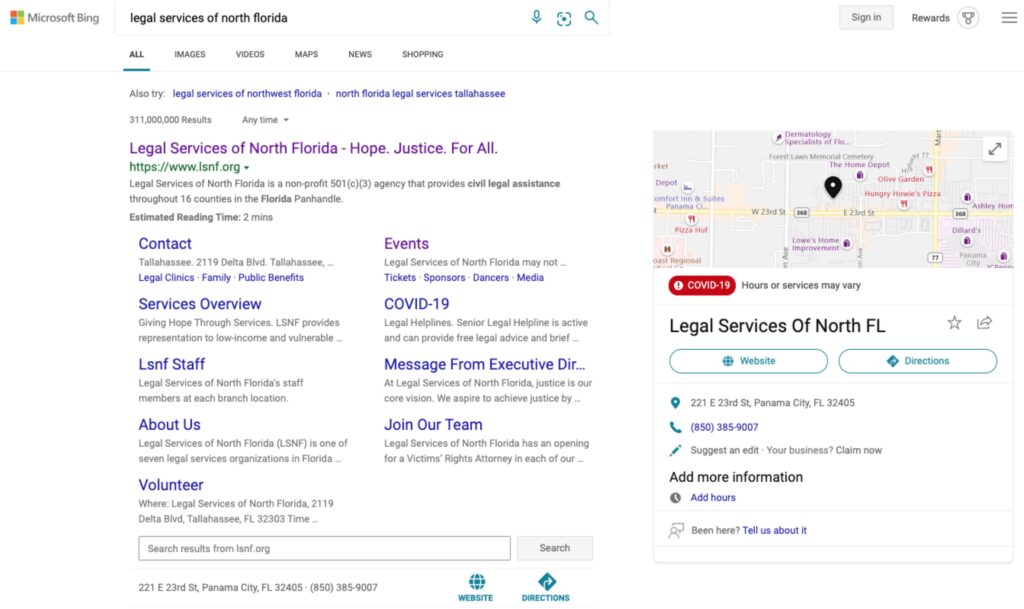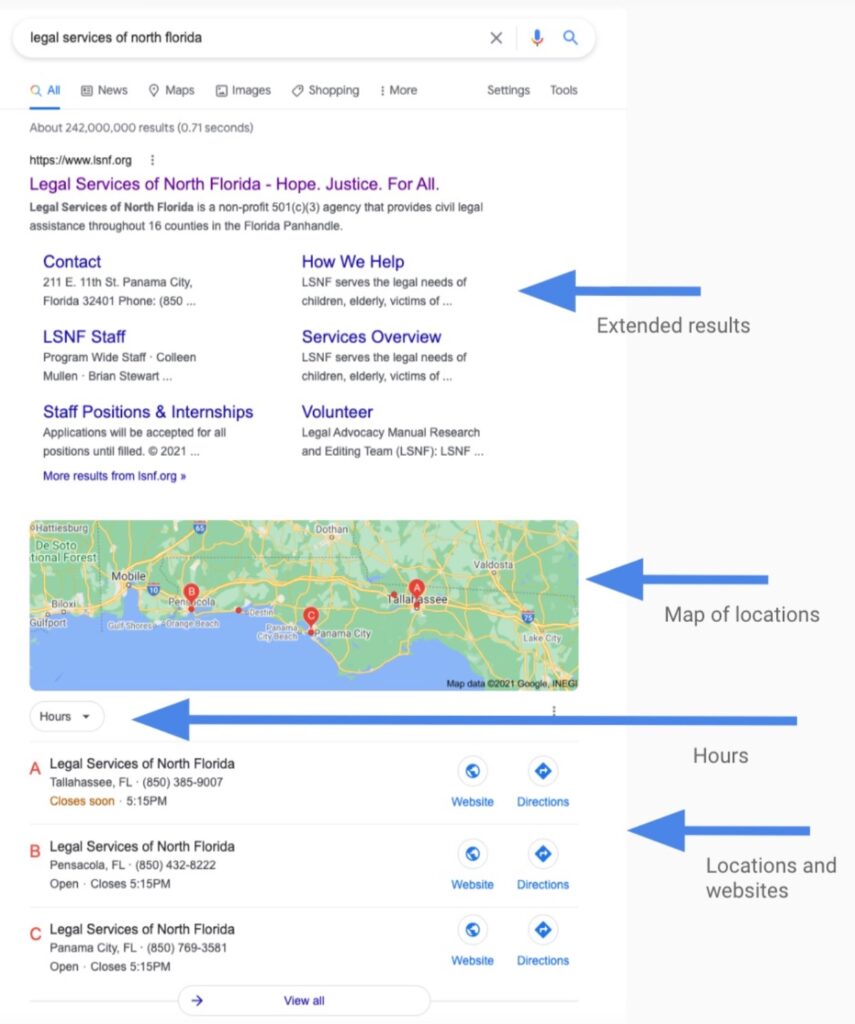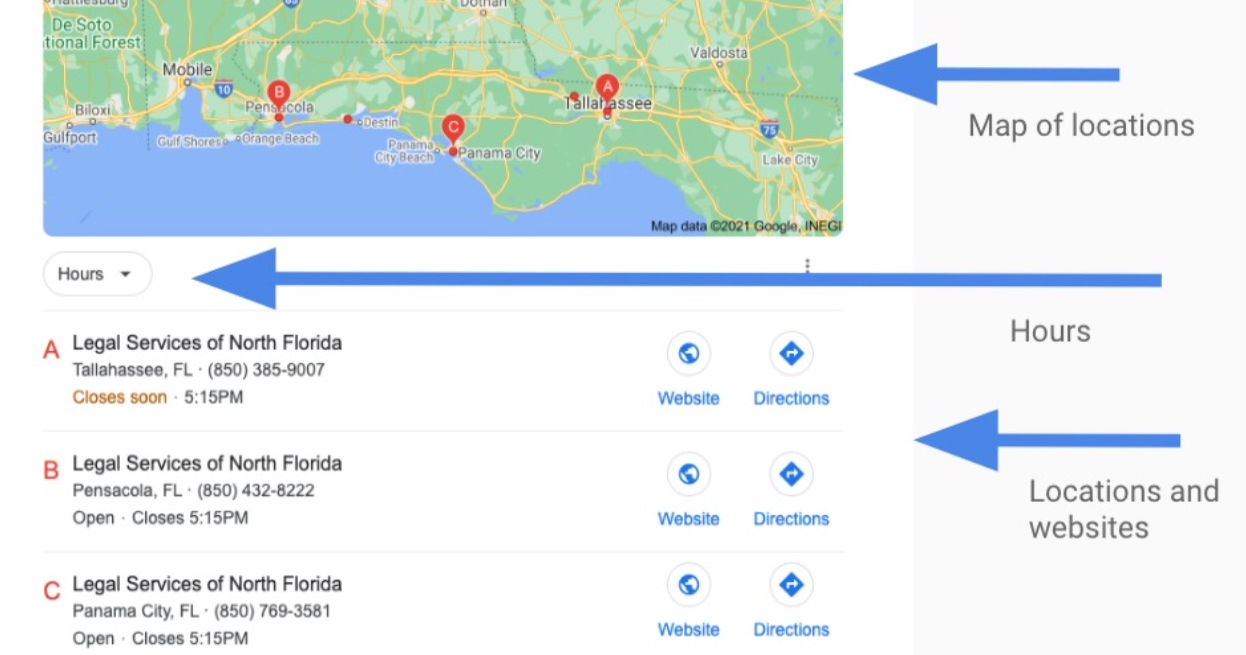Despite the vast amounts of information on the Web, finding reliable information about legal services through internet searches is harder than many expect. Basic searches — for needs like assistance with evictions, help with public benefits, or protection from domestic violence — often turn bewildering as results on Google, among other search engines, typically seem unhelpful and untrustworthy.
Every U.S. state has legal aid organizations to help people who can’t afford private law firms. But these organizations rarely have the capacity to specialize in Search Engine Optimization that can compete with private firms and even scammy operations that tend to dominate search results.
Search results don’t have to be as hit-or-miss as they are today. One promising method of improving search results is by adding specialized tags – i.e. “web markup” – to legal aid websites that help web engines better identify and index their information.
Schema.org – which represents a coalition of the major web platforms – produces such web markup for smarter search results. With schema.org’s standardized vocabulary, websites can ‘mark up’ otherwise unstructured text into structured data that can be semantically ‘understood’ by search engines.
When Open Referral first began, we worked in collaboration with the team that developed the first version of the ‘Civic Services schema’ at schema.org. We were particularly motivated by their vision of a future in which anyone could use colloquial language in their searches and easily get reliable, richly detailed results. Finally, through partnership with legal aid providers in Florida and around the country, we now have our first glimpse of that future.
In 2021, a diverse partnership of legal aid providers and technologists – including North Florida Legal Services, Stanford’s Legal Design Lab, Open Referral, ProBonoNet, Urban Insight (of the DLaw platform) and others – completed a pilot implementation that successfully demonstrated the potential for standardized directory data to improve results in searches for services on the web.
Standardizing Legal Service Directory Data – and, now, publishing it to the web
This pilot project built upon a long history of collaborations.
In 2016, Open Referral worked with Florida Bar Foundation (FBF), the Legal Services Corporation (LSC) and local legal aid providers to make it easy to collect and share information about legal aid. As our partnership began, this community maintained several different resource directories, each of which had been either not shared, unreliably maintained, or both.
Together with LegalServer, the software vendor used by all legal aid providers in the state, we developed a collaborative plan to address this challenge: all providers (at least, all of LSC and FBF’s grantees) would maintain their own service directory information within LegalServer, which would aggregate all records using HSDS and share them back with each provider within their own workflow. (Read more about this project here.) As a result of this collaboration, LegalServer’s Referral Hub now aggregates and shares information about the services of every organization using their software.
In 2020, we expanded this progress by taking the next step with the Legal Schema project: making it easier to find this legal aid directory information in web searches by publishing it with schema.org’s markup tailored for this purpose.
In the Legal Schema project, Open Referral partnered with the Stanford Legal Design Lab – along with providers from the Florida legal aid community, and technology vendors that serve legal aid providers across the country – to develop specialized web markup language that enables legal aid information to be semantically legible to search engines.
The Legal Schema project leveraged the legal aid resource directory data produced by the Florida Legal Aid Resource Federation as a test case for publishing structured web markup using schema.org’s standards. Stanford’s Legal Design Lab applied schema.org’s markup vocabulary to this content, aligning the schema.org vocabulary with the Human Services Data Specification’s data model along the way.
Stanford’s team built a prototype of a data transformer that can receive data in the HSDS format and output it into schema.org markup. The project team leveraged the output from LegalServer’s Referral Hub, translated it into schema.org markup, and loaded this markup onto Legal Services of North Florida’s (LSNF) site. The project team also supported other legal aid websites such as LawHelpNY.org (a ProBonoNet site) and Idaho Legal Aid Services, (a side on DLAW, which adopted Open Referral for its Drupal implementation in 2017).
Result: Initial success! Significantly-improved web traffic
Through several iterations, the project team assessed search results and web traffic across these sites and found a marked improvement in search-result placements and traffic metrics. In Google searches, participating websites had more information displayed in rich snippet excerpts that displayed within search results, improving searchers’ ability to understand the nature of the legal aid resource website. Sites also saw an 11% increase in the average search position, and lower bounce rates for inbound traffic. LawHelpNY saw a 30% increase in website users which they described as “stunning.”
Before:

After:

Some results were more complex: Google Analytics data showed that inbound traffic to Legal Services of North Florida’s site LSNF.org went down slightly (-2%) in the time period after the schema implementation, but the users that did come to the site had more page views per session (+15%), longer session durations (+6%) and a lower bounce rate (-11%). The organization concluded that they were getting more of the “right” inbound traffic from people who knew what they were looking for and found what they wanted.
Overall, these seem like very promising results from the first test of structured web markup as a method of publishing resource directory information.
The road ahead: supply-side strategies
As exciting as these results are, the project also affirmed that we have a long road ahead of us on this journey.
First of all, our dialogue with stakeholders affirmed the ongoing need to improve the information supply side of the equation. Even if more legal aid directory information appears in Google results, users’ experiences still depend upon the quality of that information. And information quality depends on maintenance – which is to say, humans have to be responsible for ensuring that information about legal resources is not only available but clear and accurate.
In all too many cases, we know that organizations struggle to keep on top of all this information – even when it’s information about their own services on their own websites. And we know that many communities still have redundant, inconsistent directories where such information is aggregated. Standardized web markup doesn’t solve these problems; neither will web tools that automatically apply such markup to websites. We have yet to figure out the people parts.
That said, these technical elements do increase the potential value of such investment in human resources and processes for service directory information maintenance. With data exchange standards like HSDS – which enables software systems like LegalServer to aggregate this information from their users and share it with third-party systems like WordPress, Drupal, LawHelp, etc – and these schema.org web markup standards, the legal aid community now has tools that can enable an information supply-side strategy to succeed.
schema.org for all services
In future iterations of this kind of project, we aim to continue improving the alignment of HSDS with schema.org, so that legal aid websites can present even more complex data such as information about specific services offered at different locations, more granular information about eligibility criteria, and other points relevant to folks seeking crucial legal support.
Open Referral will also explore opportunities to extend this first attempt at a schema.org translation – from a schema that is specific to legal services to a more general translation of data from the HSDS format into standardized web markup.
If this sounds like the kind of thing with which you’d like to be involved, reach out to us at [email protected] to discuss pilot project opportunities!


Leave a Reply